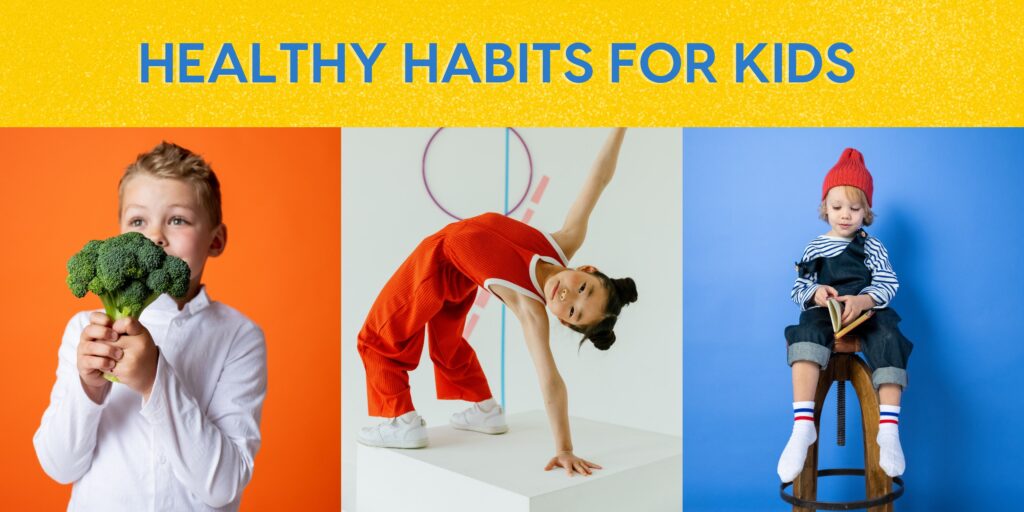Healthy Habits for Kids

It’s so difficult to give up a bad habit. Interestingly, setting healthy habits to do every day is a great challenge too. According to research by University College London, the optimal time for establishing habits is about 66 days. Yet, if an adult had acquired some habits already in childhood, there would be no need to struggle so long instilling new patterns of behavior.
How to Teach Children about Healthy Habits?
Many parents fail to change their kids` behavior because they try out everything but fix their own daily routine. The best way to motivate children is to be an example yourself.
You can’t make your child do morning exercise while sitting on a cozy sofa. Would a kid stick to new rules if he saw his parents neglecting them? Certainly not. Or, would your daughter eat a green salad if you were eating fried potatoes at the same time? You know the answer. Incidentally, research on the frequency of shared family meals claims that kids who experience eating together with their families 3 times a week have increased chances of establishing healthy eating habits.
There`re many lists of examples of healthy habits. One can define three main directions:
- Healthy eating;
- Sports and healthy lifestyle;
- Healthy mind.
Let’s talk about each type.
Healthy Eating for Kids
Expand Food Variety
Many children are accustomed to only basic tastes such as salty or sweet. Moreover, kids refuse to try new ones, which they find to be unappetizing. The fact is that their taste buds cannot enjoy other flavors. Thus, some common dishes can be perceived as exotic ones.
Encourage your kid to choose a new product at the supermarket and then cook a dish with it. Serve the meal with their favorite foods. Praise your child when he tastes a new product. It’s OK if he doesn’t like certain vegetables or fruits. Your aim is to support the desire to increase food preferences.
Drink Water
Make sure your kid consumes enough water every day. Buy him a cool water bottle which he has to drink during the day. Explain that our brain and body need water. Draw an analogy with a car where fuel or charging is required for functioning. Keep sweet drinks away. They may be present in the eating plan too, but not daily.
Don’t Miss Breakfast
Most children eat breakfast because their parents make them to. Yet, when teens, many of them begin skipping it. Well, caregivers should explain to them that breakfast isn’t a mandatory morning routine but a chance to boost oneself with energy.
Some parents try to shove food down their kids` throats. That`s a common mistake. Breakfast should be light to give them energy and not to cause drowsiness.
Sit at the Table while Having Meal
There’s time to study, time to play, and time to eat. Don`t mix eating with other activities. Teach children to have a meal only in the kitchen or a dining room. Discourage them from eating hastily or on the run. If kids don’t want to have dinner with their family, there can be some reasons for it. Maybe the situation in your family is stressful. Still, children who share their meals with family members have higher self-esteem and succeed socially.
Fast and Healthy Recipes
Cooking skills are vital for both girls and boys. Basic knowledge of how to prepare healthy meals will help them in adulthood. To motivate your little one, buy him a cookbook for children. The recipes there are supposed to be easy and yummy
Stick to these healthy habits for kids, and your little one will be deprived of such problems as obesity or eating disorders.

Sports and Healthy Lifestyle
Everyday Activity
Sporty children are more likely to be sporty in adulthood. The best way to motivate them is to be a role model. Do you need to become an athlete? Not at all. In fact, everyday walks or hanging out with a dog would be enough to maintain a healthy body. However, it’s much better to spend more time doing sport.
Good Night’s Sleep
A well-rested brain is more productive and creative. Plus, it promotes better decision-making abilities and analytical skills development. Kids who have a normal sleep schedule have better memory and can remain concentrated for a longer time. Interestingly, having an active day, children sleep better and fall asleep faster. In turn, the absence of good-quality sleep can lead to depression, high blood pressure, and other health problems. Get kids into a routine by making them go to bed and wake up at the same time.
Unplug Kids from Electronics
The health habits that children develop during the middle childhood years are mostly related to managing their time. Now we are talking about switching off smartphones and tablets. By the way, surfing the net increases chances of becoming a bullying victim. Set the time limit within which a kid has time to play games and chat on social media.
Parents shouldn’t throw computer games out of their children’s life completely, though. The thing is that some games do boost logical thinking. Playing computer games is thrilling indeed, so why not enjoy it now and then? However, when you take something away, come up with a healthy-oriented alternative. Also, don’t use gadgets to calm down your kid.
Healthy Mind
Be by Yourself
Give a kid time to be alone. They can use it to settle the mind, analyze a problem and probably come up with a decision. Also, children calm down their emotions and become more relaxed when being alone. It’s especially vital to be in silence for a little while if the family is big and noisy. Peace can be achieved in your child’s very own book nook.
Replenish Resources
To make your children mentally strong, you need to replenish their resources:
- Sleep;
- Food;
- Joy.
We have already discussed the first two points. Let’s talk about joy now. Laughing, jokes, a sense of contentment supply us with positive energy and boost our mood. Help kids to find a hobby and spend time with them every weekend doing something fun. By the way, here`re amazing spring activity ideas.
Let`s Talk
Ask kids about their school routine. Encourage them to share their difficulties with you. Discuss everything together. You may also tell some personal secrets to your kid to build confidence. In general:
- Focus more on children’s emotions;
- Don`t ground them for the bad deed they confessed to;
- Discuss various topics with your kids. Encourage them to express their point of view (fashion, politics, art, religion, science, etc.);
- Respect and don’t neglect their personal opinion.
Emotions Recognition
Teach your child to recognize the emotions he feels and control them. Strong-willed kids tend to want to control everything. To do this, visit a child therapist. It’s OK to see a specialist from time to time even if the kid doesn’t have any problems. It’s as important as regular medical check-ups.
To Wrap Up
All of the above skills and healthy habits are vital for both mental and physical well-being of your child. While bringing kids and parents closer together today these habits are also the underlying aspects of successful adult life in the future.
More articles

A Teacher And Mom’s Perspective On Growing Emotional Intelligence In Children
Have you ever asked yourself, “How do I help my child understand their feelings and handle them in a healthy way?” If yes, you’re not alone. As a teacher and a mom, I’ve heard this question from parents in school meetings, in casual chats, and even during pick-up time. The good news is, emotional intelligence […]

Core Values for Kids: Teaching Character, Responsibility & Kindness
Helping children understand who they are and what matters to them is an essential part of emotional and social development. One of the most effective ways to build character is by teaching core values early. Whether you’re a parent, teacher, or counselor, having a list of values for kids or a list of core values […]

When Do Kids Start Reading? A Parent’s Guide to Early Literacy and Chapter Books
One of the most common questions parents ask is “When do kids start reading?” Understanding reading milestones can help you support your child’s literacy journey with confidence and patience. While every child develops at their own pace, research shows predictable stages of reading growth. From recognizing letters to reading their first chapter book, this guide […]



